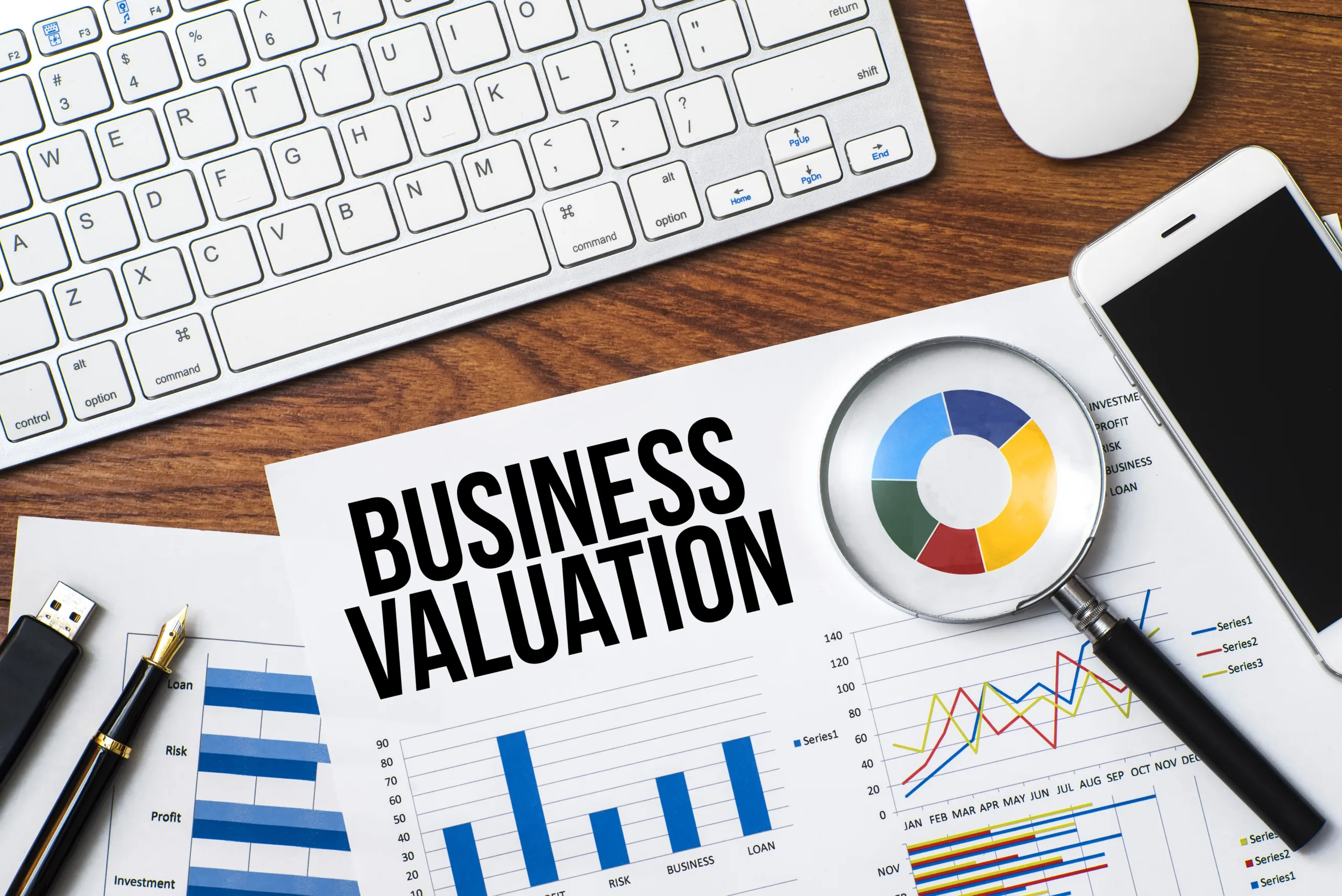Valuing Your Small Business
- Posted in Acquisition / Decision-Making
- 12 mins read

Understanding the value of your business is about more than just numbers. It reflects your hard work, the uniqueness of your brand, and the potential for future growth. Whether you’re considering selling your business, seeking investment, or simply aiming to understand your company’s market position, a comprehensive valuation is crucial. This process, however, can often seem daunting, especially for small business owners who may not have immediate access to financial experts. This article clarifies the business valuation process, offering an accessible guide tailored to small businesses’ unique needs and realities.
In this guide, we’ll explore the key factors that influence business valuation, discuss the most effective valuation methods, and highlight the common pitfalls to avoid. This article equips you with the knowledge and confidence to accurately assess the value of your business so you can understand its worth and uncover opportunities for growth and further success.
Understanding Business Valuation
Valuing a small business is an art and a science, requiring a blend of numerical analysis and market insights. It’s a critical process that helps determine a business’s fair market value for various purposes, including sales, mergers, investments, or strategic planning. Before exploring the methods and intricacies of valuation, you must grasp what business valuation is and why it’s so important.
Definition of Business Valuation
Business valuation determines the economic value of a business or company unit. It involves assessing the many aspects of a business, from its financial performance and asset base to its market position and future earnings potential. This valuation can provide a realistic estimate of what a company is worth in a competitive market.
Purpose and Occasions for Valuing a Business
- Selling the Business: Perhaps the most common reason for a business valuation, understanding the worth of your business is crucial when setting a selling price that is attractive to buyers while ensuring you receive fair compensation for your venture.
- Seeking Investors or Financing: Investors must clearly understand a business’s value before committing funds. A thorough valuation reassures investors of your business’s viability and potential profitability.
- Strategic Planning: Valuation isn’t just for selling or investment purposes. Knowing the value of your business can inform strategic decisions, helping you understand where you stand in the market and how to position yourself for growth.
- Taxation and Legal Purposes: In certain legal scenarios, such as divorce, inheritance, or disputes among business partners, a business valuation becomes a necessary tool for fair resolution.
- Mergers and Acquisitions: If you’re considering merging with or acquiring another company, understanding the value of both entities is critical to negotiate a fair deal.
Business valuation is a fundamental tool for understanding and communicating the worth of your business. It measures your business’s success and potential, providing critical information for decision-makers within and outside the company.
Key Methods of Valuation
Several methods are available for determining a small business’s value, each with merits and best-use cases. Understand these methods so you can select the one that accurately reflects the value of your business in its specific context. We will explore the three primary approaches to business valuation: Asset-Based, Earnings-Based, and Market-Based.
Asset-Based Approach
- Overview and When to Use It: This method calculates a business’s value by looking at the net value of its assets. It’s most suitable for asset-intensive businesses, like manufacturing or real estate companies.
- Calculating Net Asset Value: To use this method, tally the value of all tangible and intangible assets, then subtract liabilities. The result is the net asset value of your business. It’s essential to use current market values for assets and consider depreciation.
Earnings-Based Approach
- Overview of Methods: Earnings-based valuation focuses on the business’s income. The Price/Earnings (P/E) Ratio and Discounted Cash Flow (DCF) are common methods.
- Application in Different Business Scenarios: The P/E Ratio is simpler and looks at the current earnings against the market value of comparable companies. DCF, which is more complex, forecasts future cash flows and discounts them to present value. This approach is ideal for businesses with steady and predictable earnings.
Market-Based Approach
- Comparing with Similar Businesses in the Market: Here, the value is based on the selling price of similar businesses. This approach assumes that your business would fetch a price similar to comparable companies.
- Understanding Market Conditions and Their Impact on Value: It’s vital to consider the current market conditions and how they affect the valuation of similar businesses. This method works best for companies in industries with many comparable sales.
Each of these methods has its strengths and is applicable in different scenarios. The choice depends on the nature of your business, the industry you operate in, and the reason for the valuation. Often, business owners use a combination of these methods to get a more rounded understanding of their business’s value. In the next section, we will look at the various factors that affect the value of a company, providing deeper insight into how to appraise your business accurately.
Factors Affecting Business Value
A myriad of internal and external factors influence a small business’s value. Understanding these factors is crucial, as they can significantly impact the final valuation. Let’s delve into these elements to help you gain a comprehensive perspective on your business’s value.
Internal Factors
- Financial Performance and Projections: The historical financial performance of your business, including revenue, profit margins, and cash flow, is a primary determinant of value. Future financial projections also play a significant role, especially in the earnings-based valuation method.
- Brand Value and Customer Base: The strength and recognition of your brand, coupled with the loyalty and size of your customer base, can significantly impact your business’s value. A loyal customer base often translates to more stable and predictable revenue streams.
- Intellectual Property and Proprietary Technology: Any patents, trademarks, or proprietary technology unique to your business can enhance its value. These assets can give your business a competitive edge in the market.
External Factors
- Industry Trends and Market Demand: The current and projected trends in your industry can affect business valuation. A business in a growing industry with high demand is likely to be valued higher than one in a declining sector.
- Economic Conditions: The overall economic environment, including factors like interest rates, inflation, and economic growth, can influence how businesses are valued. For example, companies may be valued higher in a strong economy due to increased buyer confidence.
- Regulatory Environment: Changes in laws and regulations can impact your business’s operations and profitability. For instance, new environmental regulations could increase operational costs for certain companies.
Understanding these factors provides a more nuanced view of your business’s value. It’s not just about the numbers on your balance sheet; it’s also about how your business fits into the broader market landscape. In the next section, we will explore how to prepare for a business valuation, ensuring you have all the necessary information and resources.
Preparing for Valuation
Valuing your small business requires preparation and attention to detail. A well-prepared valuation yields more accurate results and provides deeper insights into your business’s health and prospects. Here’s how to gear up for a comprehensive valuation.
Collecting Necessary Financial Documents
- Financial Statements: Gather up-to-date financial statements, including balance sheets, income statements, and cash flow statements. These documents clearly show your business’s financial health and are critical for most valuation methods.
- Tax Returns: Tax returns from the past few years can offer insights into your business’s profitability and financial trends.
- Asset Records: Prepare a detailed list of business assets, including real estate, equipment, inventory, and intellectual property. Ensure that you have current market valuations for these assets.
Conducting a Thorough Business Analysis
- Reviewing Business Operations: Analyze your business operations, including your business model, management structure, customer base, and market position. This analysis helps in understanding the strengths and weaknesses of your business.
- Market Research: Conduct market research to understand industry trends, competitor performance, and market demand. This research is significant for the market-based valuation approach.
- Identifying Unique Value Drivers: Every business has unique elements that drive its value, such as a strong brand, loyal customer base, or exclusive contracts. Identifying these can help in emphasizing them during the valuation.
Seeking Professional Assistance
- Hiring a Valuation Expert: Consider hiring a professional business appraiser. They bring expertise and objectivity to the process, ensuring a more accurate and credible valuation.
- Consulting with Financial Advisors: Financial advisors or accountants can provide valuable insights into your financial data and help prepare the necessary documentation.
- Legal Considerations: In some cases, consulting with a legal expert to understand any valuation implications can be prudent, especially when legal matters are involved.
Preparation is critical to a successful business valuation. By gathering the proper documents, conducting a thorough analysis, and seeking professional assistance, you can ensure your business is valued accurately and fairly. In the next section, we will explore common pitfalls to avoid in business valuation, helping you avoid mistakes that could skew your business’s true worth.
Common Pitfalls in Business Valuation
Common pitfalls can lead to inaccurate or misleading valuations. Understanding these pitfalls is crucial for small business owners to ensure they get a fair and realistic assessment of their business’s worth. Let’s explore some of these common mistakes and how to avoid them.
Overestimating the Value of Assets
- Ignoring Market Conditions: One common mistake is failing to consider the current market conditions when evaluating assets. For example, outdated equipment may not be worth as much as its purchase price due to technological advancements or market changes.
- Neglecting Depreciation: Assets depreciate over time, and not accounting for their condition can lead to overestimating their value. Ensure you use the current market value of assets in your valuation.
Ignoring Market Realities
- Overlooking Industry Trends: Business owners sometimes overlook broader industry trends and focus solely on their company’s performance. However, industry downturns or regulatory changes can significantly impact the value of a business.
- Comparables Mismatch: Using incomparable businesses as a benchmark in the market-based approach can lead to skewed valuations. Ensure the businesses you compare yours with are similar in size, market, and financial health.
Lack of Objectivity in Self-Assessment
- Emotional Overvaluation: Business owners may have an emotional attachment to their business, leading them to overvalue it. It’s important to remain objective and seek external advisors to provide an unbiased valuation.
- Inaccurate Financial Projections: Overly optimistic financial projections can inflate a business’s value. Projections should be realistic and based on credible data and market analysis.
Avoiding these pitfalls requires a balanced and well-informed approach to valuation. Stay objective, keep abreast of market conditions, and, where necessary, seek professional advice to ensure your valuation is as accurate and realistic as possible. In the next section, we will leverage the insights from a business valuation for strategic planning and growth, turning valuation into a tool for future success.
Leveraging Valuation for Growth and Strategy
A comprehensive business valuation provides more than just a snapshot of your company’s worth; it offers critical insights that can be pivotal for strategic planning and growth. Using these insights effectively can help steer your business toward long-term success. Let’s explore how you can leverage the results of a business valuation for your company’s benefit.
Using Valuation Insights for Strategic Planning
- Identifying Strengths and Weaknesses: The valuation process can highlight areas where your business excels and where it may need improvement. Use these insights to formulate strategies that capitalize on strengths and address weaknesses.
- Making Informed Decisions: The valuation can inform crucial business decisions, such as investment in new technologies, expansion into new markets, or adjustments in pricing strategies.
Identifying Areas for Improvement and Growth
- Enhancing Operational Efficiency: If your valuation is lower than expected, it may be an indicator to streamline operations or improve productivity.
- Exploring New Opportunities: Valuation might reveal untapped market potentials or areas for diversification, prompting you to explore new growth opportunities.
- Revising Business Model: The insights gained can lead to re-evaluating your business model, especially if certain aspects of your business are undervalued.
Preparing for Future Valuation Opportunities
- Building Value Over Time: Use the valuation as a starting point to build value. Focus on long-term strategies like brand building, customer relationship management, and innovation.
- Regular Valuation Updates: Regularly updating your business valuation helps track progress and adjust your strategies as your business evolves.
- Readiness for Opportunities: Whether it’s a potential sale, merger, or seeking investors, having an up-to-date valuation means you’re prepared for opportunities as they arise.
Understanding and leveraging your business valuation results can be a powerful tool for strategic decision-making and growth. By using these insights to inform your business strategies, you can enhance the value of your business and position it for future success. In the concluding section, we will recap the importance of accurate business valuation and how it can be a stepping stone to achieving your business goals.
Conclusion
Valuing a small business provides deep insights into your business’s health, potential, and position in the market. The value of your business is dynamic, influenced by internal factors such as financial performance and external factors like market trends and economic conditions. Regularly revisiting and updating your business valuation ensures that you always have a clear and current understanding of your company’s worth.
An accurate valuation is essential for making informed decisions, whether considering selling your business, seeking investment, planning for growth, or navigating legal situations. It provides a solid foundation for negotiations and helps you set realistic goals and expectations.
The insights from a business valuation can guide you in strengthening your business strategy, identifying areas for improvement, and capitalizing on new opportunities. By understanding the true value of your business, you’re better equipped to make decisions that foster growth and resilience.
Share with:








